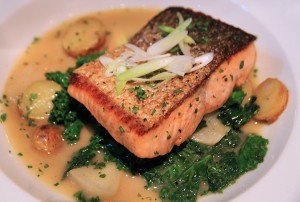Restaurant Talk is an occasional feature written by Nick Freshman, a native Arlingtonian and co-owner of Spider Kelly’s and Eventide Restaurant in Clarendon. Photos added by ARLnow.com.
 Happy New Year, Arlington! It’s been a while, but I’m back.
Happy New Year, Arlington! It’s been a while, but I’m back.
What better way to start 2014 than with another controversial topic? Kids, food trucks, tipping; you name it, and I will take it on. Well, probably not tipping ever again. That was brutal. Point is, it’s fun to explore some of the more talked about areas of what we do. So what’s first on the list for 2014? Food allergies.
Food allergies can present the most significant challenges to successful service in a restaurant. In some cases, we are told that the literal life of a guest is being placed in our hands for the duration of the meal. No pressure, Chef. It’s hard enough for us to cook a steak medium rare some nights. It’s hard for the guest as well. To constantly have to interrogate the staff about ingredients, to always need to alter the menu and to live in constant anxiety that the kitchen got it right must be terribly stressful.
Working with customers with mild to severe to fatal allergies is something that we do on a nightly basis. In fact, it was this past New Year’s Eve in the dining room at Eventide that the idea for this column came about. Faced with a limited choice tasting menu, a guest was unsure if she would even be able to stay and eat. She informed us that she had a fatal dairy allergy and was carrying an EpiPen in her purse in case she went into anaphylactic shock. She also had a gluten allergy that while not fatal was serious.
Her dining companion’s New Year’s Eve wish was to not have to stab her friend Pulp Fiction-style as the clock struck midnight.
 My answer? Let’s look at the menu and figure out how to make it work. That was not easy. We use more than our fair share of butter and there is flour in many more dishes than one might imagine. Step by step we went through the menu, consulted with Chef and tried to figure out a way to make it work on the fly.
My answer? Let’s look at the menu and figure out how to make it work. That was not easy. We use more than our fair share of butter and there is flour in many more dishes than one might imagine. Step by step we went through the menu, consulted with Chef and tried to figure out a way to make it work on the fly.
That was an example of the most challenging situation — the menu is in front of the guest, they are stuck, and we are learning of a severe allergy as they are trying to find something to eat. It is unavoidable at times to be sure, but it can make things really tough.
On an average weekend night, we have four to five tables in the dining room that have some type of allergy. Is that on the rise? I don’t know. It seems like it, but many allergies — gluten being the primary example — have been historically undiagnosed. Regardless, it is something we deal with on a regular basis, and a conversation with some helpful tips might be a good idea. Allergy sufferers usually know exactly what they need and what they want, and they are usually very good at presenting their needs early and explicitly. However, they are not always the ones making the reservations or booking the events, so this information could be helpful for non-sufferers making the plans as well.
- Plan ahead. The earlier the information can get to the restaurant the better. You can include it in the notes when you book on OpenTable, or you can mention it when you call in. Be as specific as you are able. Exactly what the allergy is and the severity is important. If the diner has preferred substitutions, that is helpful as well. This applies to dietary choices as well as allergies (vegan, vegetarian).
- Do your homework. Everyone has menus online now. Yes, it is true that restaurants are notorious for not being completely current, but you can at least get an idea what the venue offers and what might work as a substitute in advance.
- We love the cards. Many guests arrive and hand a small card to the server that lists the allergies. They are clear and concise, and they go right to the Chef. That eliminates the potentially dangerous opportunity that something might be lost in translation.
- Be clear about the severity. By all means be overcautious, but also be conscious that there is a very big difference between a fatal shellfish allergy and a mild intolerance to cilantro. Restaurants should take all allergies seriously and honor all requests that they can, but if you overstate the severity, you could limit what you can have. With a fatal allergy, we will often rule out serving you any dish or ingredient that has been in the vicinity or even the same floor as the potential offender. With a mild allergy, we might just have to remove a garnish.
- Be a little patient with the kitchens. If we hear in advance that you are coming, there is a better chance we can come up with something more interesting for you. If we hear about it the moment of, there is only so much the kitchen can do. Also, sometimes in order to cover ourselves, if there is the slightest chance of any contamination, and there is a fatal allergy, we might just say “sorry, we can’t do such and such.” It’s the last thing anyone in the hospitality business wants to do, but sometimes we might not be able to accommodate a request.
On our end, there is really only one tip: listen, be honest and follow through. We need to make sure we hear the guest and understand the situation. Then we need to tell them exactly what we can and can’t do. Finally, we need to do what we said we would. Simple, but not always easy.
I like to think that in our business we get to see it all. Every night we put on a show, and every night the cast of characters, and thus the show itself, is different. I have seen people fight, fall in love, fall apart, propose, make love, break up, get sick, cry, laugh, dance, choke, scream and yell in rage at the top of their lungs right in front of my face. On New Year’s Eve, I have seen the same person do it all in one night.
We see people at their absolute best and their absolute worst. We just want everyone to have a good time, and so you learn to get good at being ready for anything, to think on your feet and to see things happen before they do. In some ways, we are well-prepared for food allergies and the potential fallout. It’s a team effort, though, so the more information that is shared, the better.
When our special New Year’s Eve guest underscored the severity of her situation by explaining that her friend would have to dive across the table for the aforementioned Pulp Fiction re-enactment, I thought to myself as I have so many nights before, “Well that’s a new one. Just when I thought I had seen it all.” And then I went to talk to Chef to make sure I didn’t have to see that. Not on New Year’s Eve. Turns out she had a great time — and so did her friend.
The views and opinions expressed in this article are those of the author and do not necessarily reflect the views of ARLnow.com.







